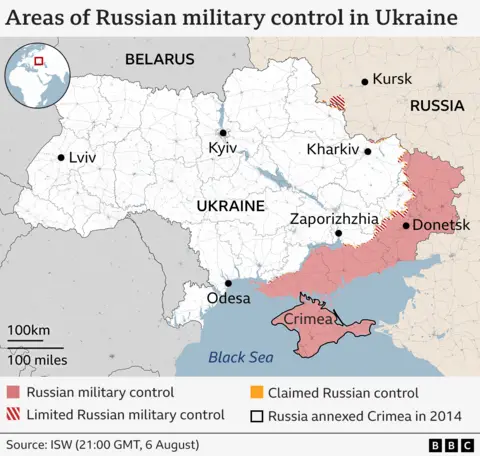In a recent statement, Ukrainian President Volodymyr Zelensky firmly rejected any notion of ceding control over the Donbas region to Russia, asserting that Ukraine would not consider any Russian proposals that included such capitulation in exchange for a ceasefire. During a critical moment, leading up to a highly publicized meeting between U.S. President Donald Trump and Russian President Vladimir Putin, Zelensky warned that yielding territory could pave the way for further Russian aggression against Ukraine.
The meeting between Trump and Putin, scheduled to take place in Alaska, has raised concerns in Kyiv. The American president suggested that potential peace negotiations may involve “some swapping of territories.” Reports indicate that part of Putin’s agenda may include pressuring Ukraine to surrender sections of the Donbas that Kyiv still controls. The alarming context of this situation is underscored by ongoing military offensives initiated by Russian forces, who have recently made significant advances close to the town of Dobropillia, managing to capture 10 km of territory in a matter of days.
In an effort to contain the narrative surrounding these advances, Zelensky acknowledged that Russian troops had made gains in numerous areas but insisted that Ukraine would respond decisively to counter these military maneuvers. He pointed out that Russia’s tactics seemed designed to create a favorable information landscape prior to the impending talks, aiming to portray an image of Russian strength while framing Ukraine as faltering. The Donbas region, comprising the eastern territories of Luhansk and Donetsk, has been under partial Russian occupation since 2014, with Moscow currently controlling almost all of Luhansk and approximately 70% of Donetsk.
Upon emphasizing Ukraine’s position, Zelensky expressed a categorical refusal to consider proposals that would require them to retreat from what he described as essential military positions in the Donbas. He articulated a deeply-held conviction that such action would merely serve to facilitate additional Russian military offensives. “If we withdraw from the Donbas today—our fortifications, our terrain, the heights we control—we will clearly open a bridgehead for the Russians to prepare an offensive,” he indicated. This sentiment reflected a resolute stance that has characterized Zelensky’s leadership throughout the ongoing conflict.
Zelensky also referenced Ukraine’s constitutional requirements mandating a public referendum before any territorial adjustments can be sanctioned, further reinforcing his administration’s unwillingness to entertain concessions that could signal capitulation to Russian demands. As the situation develops, he has voiced concerns about Moscow’s intentions for new offensives on three significant fronts—Zaporizhzhia, Pokrovsk, and Novopavlov—raising alarms for further escalations in violence.
The backdrop of the negotiations has seen President Trump articulate a much more optimistic outlook on the potential for peace, suggesting during public addresses that diplomatic efforts could yield beneficial territorial exchanges for both nations. However, Zelensky remains skeptical, feeling sidelined from discussions that directly affect Ukraine’s sovereignty. His recent remarks indicate a growing resentment regarding not only the exclusion of Ukraine from critical negotiations but also an acknowledgment that any deals subsequently made without Kyiv’s consent would result in ineffective solutions devoid of legitimacy.
Zelensky’s displeasure with the summit’s venue in Alaska, which he viewed as a platform for Putin to emerge from international isolation, further highlights the geopolitical complexities. Meanwhile, leading up to the Trump-Putin meeting, Zelensky plans to convene virtually with Trump’s team and allied leaders in Europe, urging concerted opposition against any agreements that might undermine Ukraine’s territorial integrity and sovereignty.
This multi-layered conflict involving diplomatic interactions, military stratagems, and local governance underscores the importance of maintaining Ukraine’s territorial status while navigating the treacherous waters of international diplomacy. As the talks loom, the world watches, conscious of the precarious balance of power in Eastern Europe.











